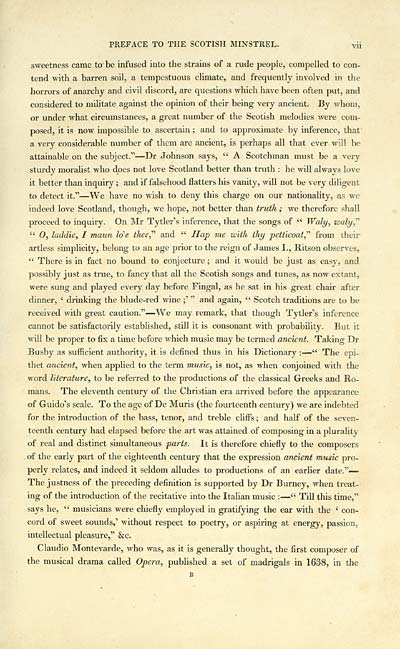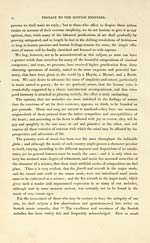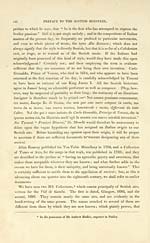Glen Collection of printed music > Printed music > Scotish minstrel > Volumes 1-3
(11) Page vii
Download files
Complete book:
Individual page:
Thumbnail gallery: Grid view | List view

PREFACE TO THE SCOTISH MINSTREL. vii
sweetness came to be infused into the strains of a rude people, compelled to con-
tend with a barren soil, a tempestuous climate, and frequently involved in the
horrors of anarchy and civil discord, are questions which have been often put, and
considered to militate against the opinion of their being very ancient. By whom,
or under what circumstances, a great number of the Scotish melodies were com-
posed, it is now impossible to ascertain ; and to approximate by inference, that
a very considerable number of them are ancient, is perhaps all that ever will be
attainable on the subject.'" — Dr Johnson says, " A Scotchman must be a very
sturdy moralist who does not love Scotland better than truth : he will always love
it better than inquiry ; and if falsehood flatters his vanity, will not be very diligent
to detect it." — We have no wish to deny this charge on our nationality, as we
indeed love Scotland, though, we hope, not better than truth ; we therefore shall
proceed to inquiry. On Mr Tytler's inference, that the songs of " Waly, waly?
" O, laddie, I maun lo'e thee,'"'' and " Hap me with thy petticoat? from their
artless simplicity, belong to an age prior to the reign of James I., Ritson observes,
" There is in fact no bound to conjecture ; and it would be just as easy, and
possibly just as true, to fancy that all the Scotish songs and tunes, as now extant,
were sung and played every day before Fingal, as he sat in his great chair after
dinner, ' drinking the blude-red wine ;' " and again, " Scotch traditions are to be
received with great caution.'" — We may remark, that though Tytler's inference
cannot be satisfactorily established, still it is consonant with probability. But it
will be proper to fix a time before which music may be termed ancient. Taking Dr
Busby as sufficient authority, it is defined thus in his Dictionary : — " The epi-
thet ancient, when applied to the term music, is not, as when conjoined with the
word literature, to be referred to the productions of the classical Greeks and Ro-
mans. The eleventh century of the Christian era arrived before the appearance
of Guido's scale. To the age of De Muris (the fourteenth century) we are indebted
for the introduction of the bass, tenor, and treble cliffs ; and half of the seven-
teenth century had elapsed before the art was attained of composing in a plurality
of real and distinct simultaneous parts. It is therefore chiefly to the composers
of the early part of the eighteenth century that the expression ancient music pro-
perly relates, and indeed it seldom alludes to productions of an earlier date." —
The justness of the preceding definition is supported by Dr Burney, when treat-
ing of the introduction of the recitative into the Italian music : — " Till this time,"
says he, " musicians were chiefly employed in gratifying the ear with the ' con-
cord of sweet sounds,' without respect to poetry, or aspiring at energy, passion,
intellectual pleasure," &c.
Claudio Montevarde, who was, as it is generally thought, the first composer of
the musical drama called Opera, published a set of madrigals in 1638, in the
sweetness came to be infused into the strains of a rude people, compelled to con-
tend with a barren soil, a tempestuous climate, and frequently involved in the
horrors of anarchy and civil discord, are questions which have been often put, and
considered to militate against the opinion of their being very ancient. By whom,
or under what circumstances, a great number of the Scotish melodies were com-
posed, it is now impossible to ascertain ; and to approximate by inference, that
a very considerable number of them are ancient, is perhaps all that ever will be
attainable on the subject.'" — Dr Johnson says, " A Scotchman must be a very
sturdy moralist who does not love Scotland better than truth : he will always love
it better than inquiry ; and if falsehood flatters his vanity, will not be very diligent
to detect it." — We have no wish to deny this charge on our nationality, as we
indeed love Scotland, though, we hope, not better than truth ; we therefore shall
proceed to inquiry. On Mr Tytler's inference, that the songs of " Waly, waly?
" O, laddie, I maun lo'e thee,'"'' and " Hap me with thy petticoat? from their
artless simplicity, belong to an age prior to the reign of James I., Ritson observes,
" There is in fact no bound to conjecture ; and it would be just as easy, and
possibly just as true, to fancy that all the Scotish songs and tunes, as now extant,
were sung and played every day before Fingal, as he sat in his great chair after
dinner, ' drinking the blude-red wine ;' " and again, " Scotch traditions are to be
received with great caution.'" — We may remark, that though Tytler's inference
cannot be satisfactorily established, still it is consonant with probability. But it
will be proper to fix a time before which music may be termed ancient. Taking Dr
Busby as sufficient authority, it is defined thus in his Dictionary : — " The epi-
thet ancient, when applied to the term music, is not, as when conjoined with the
word literature, to be referred to the productions of the classical Greeks and Ro-
mans. The eleventh century of the Christian era arrived before the appearance
of Guido's scale. To the age of De Muris (the fourteenth century) we are indebted
for the introduction of the bass, tenor, and treble cliffs ; and half of the seven-
teenth century had elapsed before the art was attained of composing in a plurality
of real and distinct simultaneous parts. It is therefore chiefly to the composers
of the early part of the eighteenth century that the expression ancient music pro-
perly relates, and indeed it seldom alludes to productions of an earlier date." —
The justness of the preceding definition is supported by Dr Burney, when treat-
ing of the introduction of the recitative into the Italian music : — " Till this time,"
says he, " musicians were chiefly employed in gratifying the ear with the ' con-
cord of sweet sounds,' without respect to poetry, or aspiring at energy, passion,
intellectual pleasure," &c.
Claudio Montevarde, who was, as it is generally thought, the first composer of
the musical drama called Opera, published a set of madrigals in 1638, in the
Set display mode to: Large image | Transcription
Images and transcriptions on this page, including medium image downloads, may be used under the Creative Commons Attribution 4.0 International Licence unless otherwise stated. ![]()
| Special collections of printed music > Glen Collection of printed music > Printed music > Scotish minstrel > Volumes 1-3 > (11) Page vii |
|---|
| Permanent URL | https://digital.nls.uk/91351311 |
|---|
| Shelfmark | Glen.217 |
|---|---|
| Additional NLS resources: | |
| Attribution and copyright: |
|
| Description | Scottish songs and music of the 18th and early 19th centuries, including music for the Highland bagpipe. These are selected items from the collection of John Glen (1833 to 1904). Also includes a few manuscripts, some treatises, and other books on the subject. |
|---|
| Description | The Glen Collection and the Inglis Collection represent mainly 18th and 19th century Scottish music, including Scottish songs. The collections of Berlioz and Verdi collected by bibliographer Cecil Hopkinson contain contemporary and later editions of the works of the two composers Berlioz and Verdi. |
|---|

